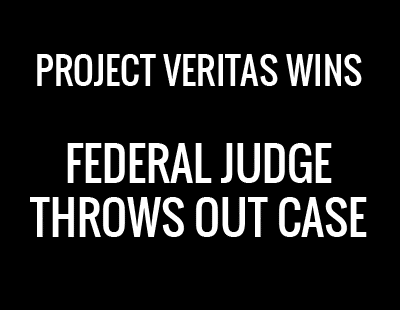(Project Veritas) A federal judge has issued a Directed Verdict in “Teter v. Project Veritas,” ruling that the plaintiff did not have the requisite evidence to support a defamation claim. Plaintiffs must prove deliberate malice on behalf of the defendant in order to prove defamation. The Directed Verdict came on the third day of the trial. Project Veritas founder James O’Keefe, who was in Asheville, North Carolina for the trial, released the following statement.
Related Beyond Censorship: Destroying Free Thought Online
by Staff Writer, May 22nd, 2019
“Let this be a lesson to all those who abuse our legal system to settle petty political disputes. The courts have once again vindicated our undercover methods and journalism. Project Veritas is 6-0 in lawsuits for a reason – the law is on our side.”
United States District Judge Martin Reidinger excused the jury late in the day on May 21 and invited arguments on why O’Keefe and Project Veritas should not be granted a Directed Verdict. The attorneys for Teter struggled to convince the judge, who would not allow the First Amendment to be trampled upon.
Buy Book Internet Censorship: Protecting Citizens or Trampling Freedom?
On Wednesday, the judge articulated passionate reasoning in his ruling to protect the First Amendment rights of journalists:
“Therefore, if citizens and the media are handcuffed by a fear of liability, that’s detrimental to political discourse, it is detrimental to society as a whole, and it is detrimental, really, to our fundamental freedom.”
The judge also tactfully dismantled each plank of the plaintiff’s argument and called it the “thinnest of thin reeds.”
“Any one of these points [of the plaintiff’s argument], if they are evidence at all of actual malice, would constitute, really, the thinnest of thin reeds.”
You can read the full transcript of this morning’s proceedings below.
Project Veritas successfully defended itself and the first amendment in this case, which lasted nearly two years. “Teter v. Project Veritas” is a landmark ruling that set legal precedent for the first amendment.
See the relevant court filings:
Memorandum in Support of Summary Judgement
Defendant’s Reply in Support of Summary Judgement Motion
Plaintiff Response to Defendants’ Summary Judgement Motion
Stillness in the Storm Editor: Why did we post this?
The preceding information is a news update. In general, staying informed as to events taking place is essential as an individual because it helps you navigate the world, and socially because you can gain and maintain rapport with your fellows. This rapport can be used to share information that can help others and improve the conditions of humanity in general. However, one must learn how to exercise discernment and proper critical thinking so they can make effective use of information gained.
– Justin
Not sure how to make sense of this? Want to learn how to discern like a pro? Read this essential guide to discernment, analysis of claims, and understanding the truth in a world of deception: 4 Key Steps of Discernment – Advanced Truth-Seeking Tools.
Stillness in the Storm Editor’s note: Did you find a spelling error or grammar mistake? Send an email to [email protected], with the error and suggested correction, along with the headline and url. Do you think this article needs an update? Or do you just have some feedback? Send us an email at [email protected]. Thank you for reading.
Source:

Leave a Reply